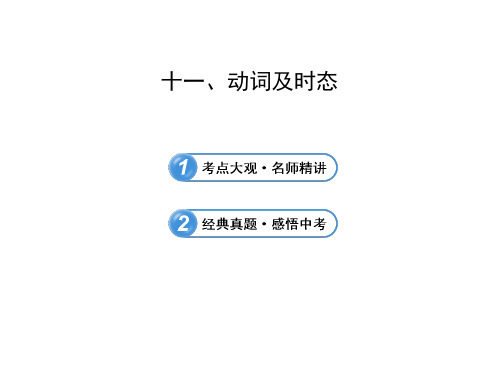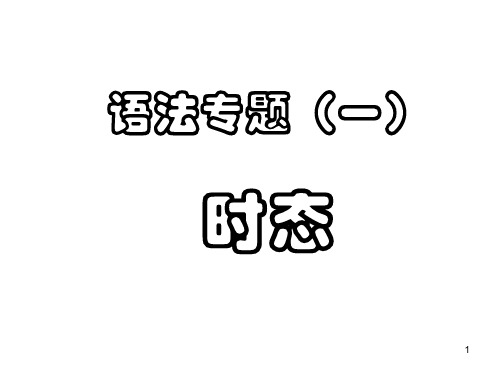(精实用)初中英语时态超好讲解.ppt
初中英语语法动词及时态ppt课件

过去进行时 主语+was/were+v. -ing+其他
现在完成时 主语+have/has+过去分词+其他
中学阶段见到的其他时态 时态
构成
过去完成时 主语+had+过去分词+其他
过去将来时
现在完成 进行时
主语+would+动词原形+其他 主语+was/were going to+动词原形
主语+have/has+been+现在分词+其他
状语
【温馨提示】
(1)在含有时间状语从句的复合句中,延续时间较长的动作用过 去进行时,另一个短暂性动作用一般过去时。例如:
My pen dropped on the ground when I was walking in the park. 在公园散步的时候,我的钢笔掉到地上了。
(2)表示两个延续性动作在过去某一时刻同时进行,不考虑动作 的先后顺序,主句和从句的谓语动词都用过去进行时,连词常 用while。例如:
词
宾语,又分为及物动词和 不及物动词。
物动 run , walk , cry , 词 swim,fall,happen
连
系 连接主语和表示主语身份、be , seem , look , become ,
动
性质、状态的动词称为连 get , grow , feel , appear ,
系动词。
turn
day等频率副词或时间状语 month.
连用
我们每月都去看望刘叔叔。
用法
例句
表示客观事实或普遍真理 The sun rises in the east. 太阳在东方升起。
初中英语六种时态复习课件(35张PPT)

②while 引导的从句表示“在……期间”,主从句谓语动词所表示的动 作同时ቤተ መጻሕፍቲ ባይዱ生。这时,主从句都用过去进行时。
e.g.:My father was reading the newspaper while my mother was watching TV.当我的妈妈看电视的时候,我的爸爸正在看报纸。
(2)表示普遍真理或客观事实。 e.g.:The sun rises in the east.太阳从东方升起。 (3)在条件状语从句和时间状语从句中,用一般现在时表示将来。 e.g.:If it doesn't rain tomorrow,we will go for a picnic.如果明天不下 雨,我们将去野餐。 (4)在某些以 here,there 开头的句子中用一般现在时表示正在发生的动作。 e.g.:There goes the bell.铃响了。
(3)现在进行时表示将来 表示位置移动的动词 go,come,leave,fly,start,meet,move 等, 可以用现在进行时表示将要发生的事。 e.g.:We are leaving for London.我们就要动身去伦敦了。
(4)一般现在时表示将来 ①表示按规定或时间表预计要发生的动作。 e.g.:Our plane takes off at 8:10.我们的飞机 8:10 起飞。 ②当主句为一般将来时,或含有情态动词,或是祈使句时,在 if,as soon as,until,when 等引导的状语从句中用一般现在时表示将来。 e.g.:I will give him the book as soon as he comes here.他一来这儿, 我就把这本书给他。
(2)表示当前一段时间内的活动或现阶段正在进行的动作。 e.g.:They are picking apples on a farm all the time.他们一直在农场 摘苹果。 (3)与 always,usually 等词连用,表达说话人强烈的感情,如赞扬、不 满、讨厌等。 e.g.:Mary is always thinking of others instead of herself.玛丽总是为 别人着想,而不为自己着想。
初中英语七种时态 初中英语语法 教学PPT课件

I am not doing my homework now.
五、过去进行时 1.过去进行时:表示在过去某一时刻或某一阶
段正在进行的动作。
2.常用时间状语: at that time, at 8:00 last
4)表示客观真理,客观存在,自然现象。 例如:The earth moves around the sun.
地球绕太阳转动。
I do my homework every day.
1.改为一般疑问句并回答。 Do you do your homework every day? Yes, I do./No, I don't. 2.改为否定句。
2.过去进行时的用法:
表示在过去某时刻正在进行或发生的动作,通常与表 示过去的时间壮语连用。
例如:At this moment yesterday, I was packing for camp. 昨天这个时候间壮语从句的复合句中,表示一个过去的 动作发生时或发生之后,另一个动作正在进行。
close
sit begin run put
lie die tie
-ing形式
listening spending staying
having preparing
closing
sitting beginning running
putting
lying dying tying
I am doing my homework now.
like live
plan stop drop
初中英语八大时态课件共77张PPT

friends. The film _____quite early, so we ____ to the bookstore after that. A. finished; are going B. finished; go C. finishes; are going D. finishes; go
教学重、难点 2、一般过去时
The Simple Present Tense
一般过去时
➢ 一般过去时指动作发生在过去 ➢ 有时候会有例如yesterday, last year等表
示 过去时间的标志 ➢ 一般过去时主要要注意动词的变化
be动词和实意动词
含有be动词的一般过去式
She is in Beijing. She was in Beijing . I am a student. I was a student. We are friends. We were friends.
I’m not a teacher
You are a worker 否认句 You aren’t a worker
She is a doctor
She isn’t a doctor.
We are friends.
We aren’t friends.
is not=isn’t
are not=aren’t
看那些乌云要下雨了. is going to Loot at the dark clouds. It
3. be +v-ing
go, come, leave, start, arrive, stay, fly, land, take off等动词可用现在进展时 表示安排和方案或即将发 生的动作。
初中英语中考复习时态讲解课件(共79张ppt)

一般现在时
1. 表示经常性或习惯性的动作
She does excersice everyday.
真题链接
—What do you often do at weekends?
—I often ____ my grandparents.
A. visit
B. visited
C. have visited D. will visit
Just a moment, I am washing dishes.
when
习题
Just a minute! My brother________ his car in the garden. A. washes B. is washing C. washed D. will wash
习题
---Hey, Tom. Let’s go swimming.
动词过去分词 不规则变化
speak hear see give build swim buy teach
spoken heard seen given built swum bought taught
现在完成时
already yet
1.过去发生或已完成的某一动作对现在的影响。
I have already watched this film. I haven't watched this film yet. I have already visited America. I haven't visited America yet.
A. prepares
B. is preparing
C. has prepared D. prepared
真题链接
--Mum, it's late. Why are you still here? --Dad hasn't come back yet. I ____ for him. A. am waitingB. was waiting C. waited D. had waited
16种英语时态讲解PPT课件

• The teacher has taught in this school since I came here.
• 9/13/2019 Since time began, man has lived in fear of fire.
14
知识扩展:与现在完成时搭配的时间状语
1) Since+时间点
用法2: 表示过去一段时间一直持续或反复发生的动作. • He used to do morning exercises. • I lived in the country for ten years. • He took a walk after supper when he was alive.
9/13/2019
12
知识扩展:不用进行时的动词
1 ) 事 实 状 态 的 动 词 : have, belong, possess, cost, owe, exist,
include, contain, matter, weigh, measure, continue…
• I have two brothers. This house belongs to my sister.
• I’ll be lying on a beach in Sanya this time tomorrow.
• Wait until seven o’clock so that they won’t still be eating.
• Don’t call me at nine tomorrow because I will be studying at the library.
时态
Tense
9/13/2019
1
一、时态概述
初中英语八种时态讲解ppt课件

当主语是第三人称 时,谓语动词要用 第三人称单数形式, 加-s/es。除此之外 都用动词原形。
7
动词第三人称单数 形式变化规则
8
规则
例子
一般在词尾加-s,(清辅音后 Play→plays 读/s/,在浊辅音后读/z/; leave→leaves 在t后读/ts/,在d后读/dz/。) swim→swims
助动词do提问,如主语为第三人称单数,
则用does,同时,还原行为动词。
4
什么情况下用?
5
①表示经常或习惯性的动作或存 在的状态。②表示主语通常的能 力、兴趣爱好、和性格特征。③ 表示客观的事实或真理。④表示 按照时刻表或已经计划安排好的 将来行为。(只限于是go, come, leave, arrive, begin, start, take off, stop, be等表示开始或移动意义的 词。)⑤在时间状语从句和条件 状语从句中,主句用一般将来时 (will+动词原形),从句中用一般
work→worked
结尾是e的动词在末尾加-d
like→liked live→lived hope→hoped
末尾只有一个辅音字母的重读闭音 plan→planned 节,先双写这个辅音字母,再加-ed stop→stopped
drop→dropped
结尾是“辅音字母+y”的动词,先 study→studied
11
一般过去时
12
概念:过去某个时间里发生的动作或 状态;过去习惯性、经常性的动作、 行为。 时间状语:ago, yesterday, the day before yesterday, last week(year, night, month…), in 1989, just now, at the age of 5, one day, long long ago, once upon a time, etc. 基本结构:①be动词;②行为动词 否定形式:①was/were+not;②在行为 动词前加didn't,同时还原行为动词。 一般疑问句:①was或were放于句首; ②用助动词do的过去式did 提问,同时 还原行为动词。
【精】初中英语八种时态PPT全面版

——Oh•, I’m(terri朝bly阳sor区ry.一模)——Have you seen Mr. Smith?
since+时• 间点—(—twYo eo’scl.ocLko, Aoukg,uhste20_0_3_,等_)__;__ his bike over there.
will He
prelatuy•srn(plAaDy..)
• C. writes…is writing
D. writes… writes
• ( 崇文区二模)Don’t turn off the radio. I _______ to the news.
——I’m• an eAng.inleisetre. n B. have listened C. listened D. am listening
I am st•udyin(g. 宣武区一模)——Do you think John will help me move the piano?
助现ret动在ur词 完ne说成••d 明时C该是—A. 谓初.—w语中rY是英itoe属语u于中’d现最bB在重e. 时要twte范也rrit围最en。难sot掌a握sCk的. 一hisi个mw时.rHi态tien,g_同_时_也_D_是._中w_r考_o_英te_语a中c一o个m最p重os要it的io时n.态考点.
• All things are difficult before they are easy. 凡事总是由难 而易。
• Shanghai lies in the east of China.上海位于中国东部。 • The teacher told us yesterday that December 25 is
• 2.用法 • a. 表示经常发生的动作或现阶段的习惯性行为,常与时
初中英语八大时态讲解_图文

2 have been to+地点,表示“去过某地”
。(人已回) I have been to Europe. (I am not in Europe now.)
3 have been in+地点+时间段,表示“在/ 来某地多久”。
I have been in Europe for three weeks. (I am now still in Europe .)
go there get home open close get to know borrow buy
be there be home be open be closed know keep have
1.The film began 5 The film_h_a_s b_e_en_o_n__ for 5
• 9.They got to know 10 They_h_av_e_k_n_o_w_n__since 10
years ago.
years ago.
• 10.I borrowed the book a I_h_a_v_e _k_e_p_t _the book for a
week ago.
week.
二、一般过去时
1.用法:过去的动作或状态。
2.标志词:
yesterday, the day before yesterday,
three days ago, last night/week/month…,in the past;just
now=a moment ago
例题
Li Ming didn’t understand what American people
4.He joined the club 3 He__h_as_b_e_en_i_n__the club for
初中英语动词【时态语态】PPT课件

·译林牛津版
④“be going to+动词原形” 也可表示将来时。 a.表示主观意愿、打算等。如: He's going to learn English next term. 下学期他打算学英语。 b.根据已有迹象,可能要发生的情况。如: Look at the black clouds!It __is_g_o_i_n_g_t_o_ rain. 看那些乌云!马上要下雨了。 [提示] 非延续性动词的进行时常表达将来之意,如: come,go,leave,start,finish等。 She's leaving for England next month. 下个月她将去英国。
初中英语动词时态语态
考点
1.掌握动词的第三人称单数形式、过去式、 过去分词和现在分词的构成。
2.掌握动词的8种时态的基本结构及区别。 3.了解过去将来时、过去完成时的基本用 法。
考点一:动词的时态 初中阶段应掌握的时态共有八种,即一般现在时、一般
过去时、一般将来时、现在进行时、过去进行时、过去将来 时、现在完成时和过去完成时。
Tom __w_e_n_t_ to Shanghai last year. 去年汤姆去了上海。
John __d_id_n_'_t_l_iv_e_ here last year. 去年约翰没有住在这里。 Did you see him just now? 你刚才看见他了吗?
·译林牛津版
(2)用法: ①主要用于过去的某个时间发生的动作或存在的状态。 His friend was at work yesterday. 他的朋友昨天在工作。 ②表示过去经常或反复发生的动作,常与often,always 等 表示频度的时间状语连用。 We often went to work by bus last year. 去年我们经常乘公交车上班。 ③和when 等引导的时间状语从句连用。 When he got home,he __h_a_d__ a rest. 当他到家时,他休息了一会儿。
初中7种时态整理归纳PPT课件

2021/6/4
7
时态名称: 一般过去时
表示意思: 构成:
表示过去某时发生的动作或状态, (可能是一次性,也可能经常 发生。)
V过去式
一些标志: ago, yesterday, last week/year
例句:
He watched TV last night.
2021/6/4
8
更多
• ① 表示过去具体时刻发生的一次性动作时,时
• 如:A man told them that the woman was to give birth to the special baby.(有一个人告诉他们那个妇
女就会生下那个特别的男孩)
• It’s going to rain soon.(天快要下雨了)
2021/6/4
16
• ④ 表示一个人临时决定要做某事,可以
时态名称: 现在完成时
表示意思: 构成:
过去发生的事情对现在有影响。
过去发生的动作一直持续到现在并 且有可能继续持续下去。”已经”
have/has +done
标志: 例句:
2021/6/4
already , just , since , yet , for 2 years He has been a teacher for 2 years.
2021/6/4
2
更多
• ① 一般现在时句子中常有的时间状语:
often,usually,sometimes,always,eve ry (day等), once/twice,a (week等), on (Sunday等),never,in the (morning
等)。
• 如:They go to the Palace Museum once a year.(他们每年去一次故宫)
八大时态讲解PPT课件

Have you phoned him yet? (否定回答): No ,I haven’t.
精选ppt课件最新
2299
※常和for+时间段、since引导的 时间状语、how long 连用。 How long have you known her?
I have known her for three years.
She is always thinking of others
instead of herself.
Why are you always coming late?
精选ppt课件最新
1100
※有些动词(arrive,come,go,leave) 的ing形式可表示将发生的、计划或 安排好的事。
We are leaving here next week. She is coming to see me tomorrow.
The train is about to leave.
※be about to do when 正当…时
I am about to leave when the phone rings.
精选ppt课件最新
2255
注意:在从句中的将来时态,will要 变成相应的时态。
She said she would help me if she finished her work.
精选ppt课件最新
88Biblioteka 1、构成 现在进行时由“助动词be
(am/is/are) + doing”构成。
精选ppt课件最新
99
2、用法
※表此时此刻正发生的动作,常与 now连用。 They are cleaning the room.
- 1、下载文档前请自行甄别文档内容的完整性,平台不提供额外的编辑、内容补充、找答案等附加服务。
- 2、"仅部分预览"的文档,不可在线预览部分如存在完整性等问题,可反馈申请退款(可完整预览的文档不适用该条件!)。
- 3、如文档侵犯您的权益,请联系客服反馈,我们会尽快为您处理(人工客服工作时间:9:00-18:30)。
(精实用)初中英语时态超好讲解.ppt初中英语语法动词的时态总复习动词的时态结构歌谣一般时一般现在时,动词用原型;单数三人称,谓语动词尾+s/es 。
一般过去时,动词用过去式。
I work.He works.I worked.am,is,are,-ing。
现在进行时,例句:I am working.was,were,-ing。
过去进行时,例句:I was working.将来时一般将来时,will加原型。
I will work.would加原型,过去将来时,I would work.完成时现在完成时,have/has加过分。
I have worked.过去完成时,had 加过分。
I had worked.各种时态的用法一、一般现在时1.用法:A.现在经常性的动作或状态 B.客观事实和真理。
2.标志词:always,usually,often, sometimes, never,every day /week /month/year/…1.The boy usually____________(get) to school early.2.Light ____________(travel)faster than sound.二、一般过去时1.用法:过去的动作或状态。
2.标志词:yesterday,the day before yesterday, three days ago, last night/week/month…,in the past;just now=a moment agoThe last time I ___ to the cinema was two years ago.A.goB.have goneC.have beenD.went三、现在进行时1.用法:A.现刻动作:目前正在发生的动作。
B.现阶段动作:目前一个时期一直在进行的动作,此刻不一定在进行。
2.标志词:now,Look! Listen!中考模拟:--Mike, who____football in the yard?--Let me go and see.A.has playedB.will playC.was playingD.is playing1.Look!What___the children___ over there?A.are;doB.are;doingC.is;doD.is doing2.Those workers____here these months.A.are workB.are workedC.workD.are working3.—Listen! The phone ___. Please go to answer it.A.ringsB.rangC.will ringD.is ringing4.--Must I water the flowers now?--No, you needn’t. Jack_____them.A.is wateringB.wateringC.watersD.is watered四、过去进行时1.用法:过去某时正在进行的动作。
2.标志词:at that time,this time yesterday,then,when…1.I ____ along the road when I saw Peter. So we stopped and had a chat.A. walkedB.was walkingC. would walkD. had walked2. –Amy,I called you yesterday evening, but nobody answered the phone.–Oh, I ____ a walk with my mother at that time.A.takeB.was takingC.am takingD.took五、一般将来时1.用法:将来的动作或状态。
2.结构:will/ shall/ be going to+V.(原型)3.标志词:tomorrow,the day after tomorrow,in three days,in (the) future,next week/month/term…, from now on(第一人称)4.shall/will/be going to之间的区别:1.计划决定要做某事,一般用be going to do 结构。
2.will常用于表邀请或命令时以及带有意愿色彩。
3 shall往往用于第一人称疑问句, will可用于任何人称。
1.There___two meetings tomorrow afternoon.A.are going to beB.are going to haveC.is going to beD.will have2.The twins____to the cinema with their parents tonight.A.will goB.would goC.are goD.went3.---When____we have the meeting?---At 8.A.areB.shallC.wouldD.will4.--When___you___for London?--Next week.A.will;leavingB.are;leavingC.shall;leaveD.have;left六、过去将来时1.用法:从过去看将要发生的动作。
2.结构:would, was/were/going to+v.(原型)1.--What did he say yesterday?--He said he____to Sydney next week.A.goesB.will goC.would goD.are going2.--Did your son fail his English exam once again?--Yes, but he told me he____hard next term.A.studiesB.is studyingC.will studyD.would study七、现在完成时1.现在完成时基本含义过去的动作对现在的影响。
I have finished my homework.过去的动作持续到现在。
I have stayed here for an hour!2.标志词:already, just, yet, ever, never, so far(till now/up to now), recently, in the past 3 years, before, since+时间点,for+时间段3.现在完成时和一般过去时的异同点:共同点:动作都在过去。
不同点:和现在有无关系。
(与现在有关的过去动作用现在完成,与现在无关的过去动作用一般过去。
)4.易错点:have gone to+地点,表示“已去了某地”。
(人在旅途。
只用于第三人称。
)They have gone to Europe.(They are not here.)have been to+地点,表示“曾去过某地”。
(人已回)I have been to Europe.(I am not in Europe now.)have been in+地点+时间段,表示“在/来某地多久”。
I have been in Europe for three weeks.(I am now still in Europe .)5.瞬间动词和延续性动词若句中出现时间段,则必须使用延续性动词。
瞬间动词和延续性动词转换关系如下:begin/start be on go there be there leave be away get home be homedie be dead open be openborrow keep close be closedget to know knowbuy have come here be herejoin be in / be a member of用表格里的词的适当形式填空1.The film began 5 minutes ago. The film___ ___ ___ for 5 minutes.2.They left an hour ago. They____ ____ ____for an hour.3.The man died a week ago. The man___ ____ ____ for a week.5.I borrowed the book a week ago. I____ _____the book for a week.6.I bought the car a year ago. I____ ____the car since a year ago.单项选择1.--What a nice bike! How long____you____it?--Just two weeks.A.will;buyB.did;buyC.are;havingD.have;had2.--How long have you____here? --Since 1997.A.arrivedB.moved/doc/a19974342.html,eD.lived3.--I can’t find my pen.____you____it anywhere?--No.Look!What’s that under your book?A.Have;seenB.Do;seeC.Did;seeD.Had;seen4.--I’m sorry to have kept you waiting.--Oh,not at all.I__here for only a few minutes.A.will beB.wasC.amD.have been5.I won’t go to see the film because I____the ticket.A.lostB.have lostC.will lostD.didn’t lost八、过去完成时1.用法:发生在过去的过去的动作。
They had got married when he came back.2.标志词:by the end of…,by the time…,when+一般过去时过去完成时是一种相对存在的时态,判定时必须根据上下文找到一个可以作为参照点的过去时间,在此参照点前发生的动作都可以用过去完成时。
单项选择1.We____learning 1000 words by the end of last term.A.finishedB.have finishedC.had finishedD.finish2.The train____when we got to the station.A.leavesB.have leftC.were leavingD.had left3.By the time he returned,his son____supper.A.cooksB.had cookedC.has cookedD.was cooking认真理解以上八种时态,选择填空1.Sorry,I____to help you at ten.I was busy at the moment.A.won't comeB.can't comeC.didn't comeD.shouldn't come2.He_______this pen for five years.He______it in 1997.A.has bought,bought.B.bought,boughtC.has kept,has boughtD.has had,bought3.She_________the flowers in the garden when I_________to see her yesterday.A.watered,wentB.was watering,wentC.watered,was goingD.was watering,was going4.I don 't know if my friend_________.If he _________,I'll let you know./doc/a19974342.html,es,comes/doc/a19974342.html,es, will comeC.will come,comesD.will come,will come5.John said he_________ supper.He was quite full.A.had hadB.was havingC.hadD.has eaten6.There_________two parties next week.A.are going to beB.are going to haveC.is going to beD.will have7.It______10 years since I______here.A.is,comeB.is,have comeC.was,cameD.is,came8.--Kate likes eating chocolate.--____. Look, she is eating.A.So Lucy doesB.So does LucyC.So they doD.So do they9.Kate_________to bed until her mother_________back.A.won't go,comeB.hadn't gone, cameC.went,cameD.didn't go,came10.His brother_________from home for a long time.A.has leftB.has been awayC.leftD.will leave11.--Lucy,___you____your ticket? --Not yet.A.did;findB.have;foundC.has;foundD.do;find12.--____to the United States?--No,never,but I went to Canada a few years ago.A.Have you beenB.Have you goneC.Did you goD.Have you went13.The man who lived on the island thought he___ never____.A.will;foundB.would;be foundC.is;foundD.had;been found14. --I don’t know if his uncle____.--I think he___if it doesn’t rain.A.will come; comesB.will come; will come/doc/a19974342.html,es; comes/doc/a19974342.html,es; will come15.--Linda had nothing for breakfast this morning,__?--No,she got up too late.A.had sheB.hadn’t sheC.did sheD.didn’t she16.The flowers____well if they____.A.won’t grow; don’t take good care ofB.don’t grow; are taken good care ofC. won’t grow; are not taken care ofD. don’t grow; don’t take care of17.--Hurry up! It’s time to leave.--OK,____.A.I’m comingB.I’ll comeC.I’ve comeD.I come18.There____an English evening next Tuesday.A.wasB.will beC.will haveD.are going to be19. I must return the camera to Li Lei, I____it for two weeks.A.keepB.borrowedC.have keptD.have lent20.--When__ this kind of computer__?--Last year.A.did; useB.was; usedC.is; usedD.are; used21.--Jerry,____you____your lost book? --Not yet.A.did;findB.have;foundC.has; foundD.do;find22.--Don’t forget to post this letter for me,please!--No, I____.A.don’tB.won’tC.mustn’tD.can’t23.Do you know if____back next week? If he____back,please let me know.A.he comes, will comeB.will he come; comesC.he will come; comesD.will he come, will come。
